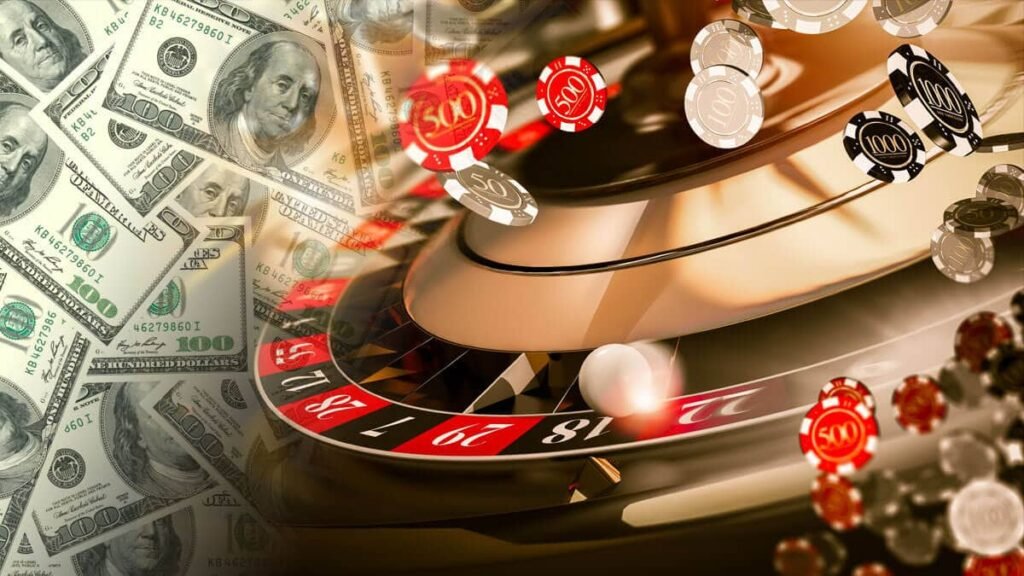Winning at the casino feels exhilarating. Your number hits on the roulette wheel, the reels line up on the slot machine, or you walk away from the blackjack table with more chips than you started. Now you’re playing with house money—the casino’s money that you’ve won. Should you risk those winnings and keep gambling?
The temptation is real. Having extra money that you didn’t walk in with alleviates the loss if you lose it. The casino offers free drinks to loosen your inhibitions. It all contributes to a dangerous mindset of having less at stake. However, there are good reasons not to risk house money.
House Always Wins in the Long Run
While you may score short-term wins, the games are statistically designed to favor the house over time. The more spins, hands and rolls over an extended period, the more the math works against every player. Gambling with house money does not change those odds or probabilities. The table shows the built-in house advantage across common casino games on such platforms as Leon Casino:
House Advantage By Game
| Game | House Edge |
| Roulette | 5.26% |
| Blackjack | 0.5% to 2% |
| Craps | 1.41% |
| Slots | 2% to 15% |
| Video Poker | 5% to 10% |
Over many bets for many players, the house always comes out ahead. Gambling with house money does not improve your advantage over the casino—the edge remains tilted in the house’s favor.
Chasing Losses
When a winning streak seems too good to walk away from, that feeling is often tied to wanting to recover from previous losses. The temptation to “get even” or chase losses persists among gamblers, especially after scoring a big win. However, reacting emotionally leads to classic pitfalls:
- Pursuing break-even points after losses
- Justifying higher bets due to temporary good luck
- Falsely perceiving more control than mathematically exists
Wagering house money triggers the same irrational beliefs. A winning streak offers the dangerous illusion of reversing earlier losing sessions. The winnings seem like a sign of changing luck, but they do not influence the random outcome of future bets. Ultimately, chasing losses only leads to bigger net losses.
Casino Environment
Casinos employ numerous psychological tactics to keep players gambling longer:
- No clocks remind you how much time passes
- No windows to let you see how late it gets
- Free drinks impair judgment and encourage looser spending
- Upbeat music and lighting foster an energized mood
This atmosphere entices you to sit down at more tables and machines when you already have house money built up. Bright lights, sounds, alcohol and excitement are designed to produce a kind of “machine zone” where players focus solely on the game. Surrounded by all the sensory stimulation, it becomes harder to walk away from the action.
Self-Imposed Limits
Rather than ride hot and cold streaks on emotional impulse, limit sessions by time and money. Setting a budget for entertainment spending helps avoid financial regret. Self-control requires planning:
- Set a time limit in addition to a monetary limit
- Pace gambling activity to avoid careless bets when tired or intoxicated
- Leave bank cards locked up to reduce spur-of-the-moment withdrawals
- Take frequent breaks for food, restrooms or simply stretching legs
Mentally committing to those limits is crucial when temptation looms after scoring a big win with house money. Sticking to a budget and timetable helps you secure profits and quit while you’re ahead.
Illusion of Control
A variety of cognitive and emotional biases come into play when gambling with house money:
- Gambler’s fallacy – Past results seem to influence future outcomes when in fact they are independent. Winning streaks incorrectly signal “hot” machines or a lucky night.
- Loss aversion – Losing original funds feels worse than losing equivalent house money, despite the same monetary value.
- Illusion of control – Winning inflates a feeling of skill and choice when uncontrollable randomness determines every result.
- Emotional attachment – Winning with particular machines or dealers generates a sentimental preference to keep playing those games.
Understanding these psychological traps helps overcome biased thought processes. When gambling with house money, the games do not suddenly become more beatable. Each wager faces the same built-in mathematical edge favoring the casino.
Separating Emotion and Reality
Contrasting emotional perceptions with mathematical realities brings inflated confidence back down to earth:
- Each independent spin, roll or deal resets to the same fixed odds.
- Lucky winning streaks are still short-term variance within an inevitable long-term losing trajectory.
- Comps, freebies and VIP status aim to incentivize further playing, not reward skill.
- The house money belonged to the casino originally; it was never extra or disposable funds.
These perspectives help counter the fiction of control. When gambling with house money, players face the same odds and expected losses posing as wins.
Why Casinos Promote Gambling House Money
While gambling with house money psychologically benefits the player temporarily, it ultimately favors the casino over time. Here is why operators actively encourage players to risk winnings:
- Extends play – Bankrolled by wins, players handle more losses and play longer before spending original funds.
- Loosens restraint – Free drinks and a relaxed mood lead to less controlled betting with the “free” money.
- Fuels false hopes – Landing big wins convinces players their luck is changing, as they now chase losses or seek to profit.
- Creates loyalty – Big wins early in new players give a false impression that casinos reward first-timers.
- Adds incentives – Special offers and VIP schemes for winners incentivize them to return and play more with house money.
Essentially, gambling with house money benefits the casinos. The revenue boost outweighs the temporary wins accumulated by players in positive variance. Ultimately, the math grinds most players down after enough plays.
Tips for Handling Big Wins
When lady luck hands you a big win, enjoy the moment but retain discipline going forward:
- Cash out your original bankroll so you play only with house money
- Stick to pre-determined time and budget limits
- Pace your gambling activity to avoid emotional decisions
- Recognize the win as short-term luck instead of a change in odds
- Do not try to win lost money back after you lose the house money
- Be content walking away from tables and machines while you’re ahead
Cashing out initial funds secures profits rather than risking losing it all back to the house. Disciplined players know when to settle for wins. Getting too greedy trying to maximize house money means underestimating the casino’s edge on every subsequent bet.
Bottom Line
In the end, house money is an illusion. Big wins feel great at the moment, but still face challenging probabilities going forward. The casino atmosphere entices you to press your luck, but restraint ultimately serves players best. Limit sessions, set budgets, take breaks and avoid chasing losses. Once house money starts looking like “real” money again, it loses the false perception of being somehow expendable. When emotions run high, math dictates the long-term reality. Separate feelings from facts. More spins and rolls favor the house, regardless of what brought you the temporary winnings. Play responsibly within your means and never risk more than you can afford to lose – whether gambling with your own bankroll or house money.

